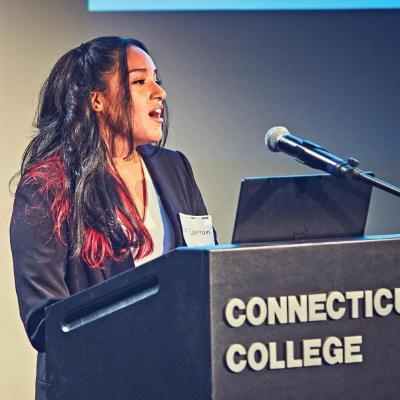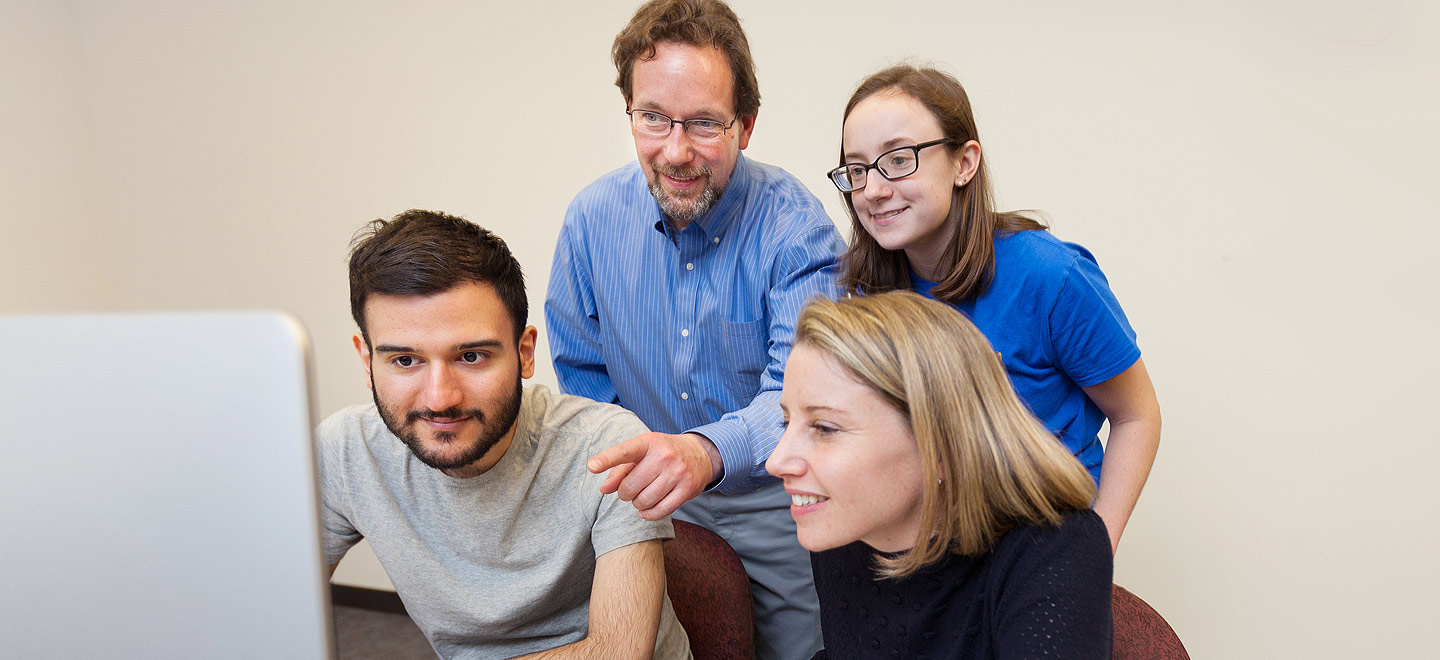
Pathways
Integrative Pathways, a cornerstone of Connections, help prepare students for a meaningful life after Conn.
Erin O’Brien Powers ’20 has always been interested in medicine. But the behavioral neuroscience major, who hopes to pursue a career in healthcare, had never really considered the impact of food access on health until she enrolled in Connecticut College’s new Public Health Pathway.
“People often associate health and medicine solely with doctors and hospitals, but there are so many different factors that determine health outcomes,” she said. For example, “Our health and what we eat are directly related. But many people who live in poverty don’t have access to healthy food, or, if they do, they can’t afford it.”
O’Brien Powers is a member of the inaugural class of Connecticut College students taking part in Connections, the College’s reinvention of the liberal arts for the 21st century.
A cornerstone of Connections is the Integrative Pathway, a set of courses and experiences organized around a central theme. Modeled after the College’s innovative centers for interdisciplinary scholarship, Pathways allow students to explore issues they are passionate about by intentionally combining their academic major with interdisciplinary study and off-campus learning through study away and a relevant internship. The Pathway culminates in an all-College symposium where students present the results of their integrative studies to the larger campus community.
The College officially launched Connections with the arrival of the 494 members of the Class of 2020, who participated in specially designed introductory courses called first-year seminars, supported by a team of advisers who helped them identify their interests and create personalized education plans. Three years into Connections, 60 percent of all Conn students are enrolled in 11 Pathways, or in one of the four interdisciplinary center certificate programs. The largest Pathways are Public Health, Entrepreneurship and Social Justice and Sustainability.
“With the introduction of Pathways, we have expanded the groundbreaking educational model of our centers to a wider group of students, putting the College once again at the forefront of integrative education for the liberal arts,” said Dean of the College Jefferson Singer.
“We are now well on the path to providing this type of education for every student.”
Students are enrolled in 11 Pathways: Bodies/Embodiment; Cities and Schools; Creativity; Entrepreneurship, Social Innovation, Value and Change; Eye of the Mind: Interrogating the Liberal Arts; Global Capitalism; Migrations, Displacements, (Im)mobilities; Peace and Conflict; Power/Knowledge; Public Health; Social Justice and Sustainability. Three new Pathways are in development: Media, Rhetoric and Communication; Data Analytics; and Food.
Juliet Wilson ’20, a sociology major and an art history minor who hopes to pursue a career in fashion advertising, enrolled in the Bodies/Embodiment Pathway to explore her interest in the way certain body types, sizes, races and genders are portrayed in the media.
“One week we are dancing Capoeira to explore our body’s movement and perception in a given space, and the next we are learning costume history and the implication clothing has on our bodies,” she said.
Associate Professor of Sociology Afshan Jafar, who co-coordinates the Bodies/Embodiment Pathway, compares the traditional general education “checklist” of courses to puzzle pieces that don’t fit together. With Connections, she says, students are still gathering pieces from different areas, “but those pieces are going to fit, and you are going to put this puzzle together.
“Being exposed to different perspectives and being able to find the common thread between them is an important skill. No matter what profession they choose, our graduates will be able to synthesize all kinds of information and make the connections that lead to solutions,” Jafar said.
Connections is catching on. The Class of 2022 is one of our largest and most diverse classes in our history. And 93 percent of these new students said that Connections was the main reason they decided to come to Conn. Additionally, Professor of History Sarah Queen recently traveled to Copenhagen, Denmark, to deliver a presentation to a conference sponsored by the prestigious Aspen Institute, as part of its Undergraduate Business Consortium. And her presentation generated serious buzz, earning high praise in an article written by the Aspen Institute’s founder of the Business and Society Program.
“The College’s Connections program is definitely on the map in Europe, Canada and throughout the U.S., which is very exciting,” said Queen who heads up Conn’s Global Capitalism Pathway, which teaches students to address the practical, moral and ethical dilemmas business leaders face in the modern economy by incorporating the humanities into business-related courses.
“I spoke to a packed room, and there was a line of educators waiting for me afterwards, many of whom asked if I would visit their home institutions to discuss Conn’s program in even more detail.”
The goal of the Pathways structure is to close the gap between practical preparation for a career and the development of critical thinking skills that impact virtually every area of the student experience, including their majors, minors, study away work and community internships. Each Pathway was designed to complement any major and help students connect their passions and interests with internship and career opportunities, Singer said.
“The Pathways are powerful vehicles for students to see the applications of what they are learning in the classroom.”
As a member of the first group of students to embark on the Pathway experience, Kenneth Colombe ’20 considers himself to be an academic trailblazer of sorts. Colombe, who plans to double major in economics and statistics, is enrolled in the Entrepreneurship Pathway.
“Connections is the culmination of the liberal arts—you get to weave together different classes, passions and points of view. It’s cool to know that our experience will help shape future Conn students’ curriculum for the better,” he said.
Wilson, who plans to study and intern in New York City at the intersection of fashion, art and media, agrees.
“Knowing that I would have the opportunity to complete core curriculum classes all centered around my interests was definitely a factor in my decision to attend Connecticut College.”

